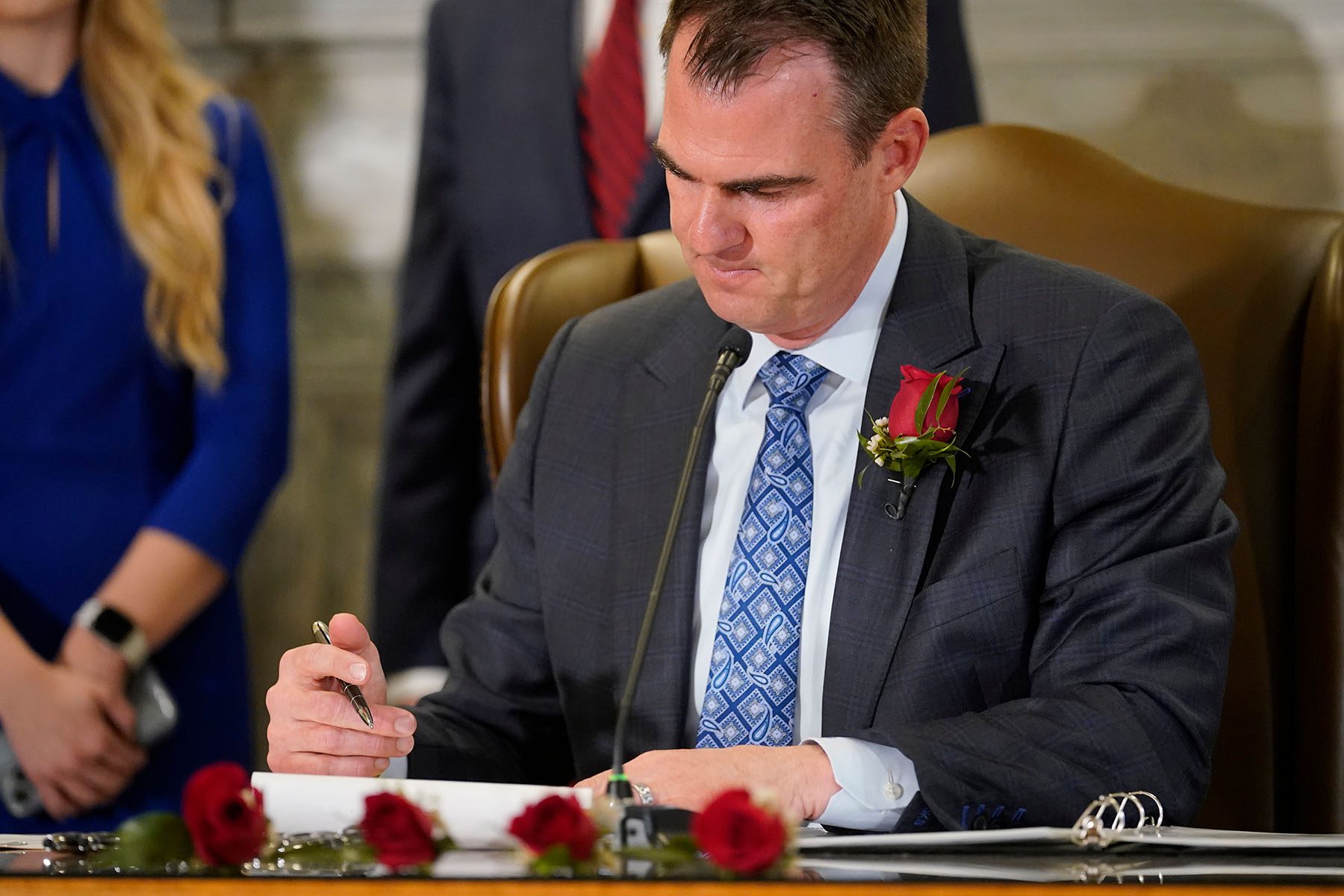Editor’s note: This article has been updated throughout.
Oklahoma’s legislature has passed two Texas-inspired laws that would allow civil lawsuits against anyone who might “aid or abet” any abortion. Gov. Kevin Stitt, a Republican, has indicated he plans to sign both bills, which would take effect immediately.
One bill, House Bill 4327, would outlaw virtually all abortions, with an exception if the pregnant person’s life were in immediate danger; pregnancy resulting from rape or incest is only an exception if it has been reported to law enforcement. After amendments were added to it, HB 4327 will go back to the House, which has already passed a version of the bill. The other bill, Senate Bill 1503, would create penalties for abortions done after six weeks of pregnancy.
It’s not clear when Stitt will sign the two bills. But clinics are preparing for an immediate shutdown of services — making Oklahoma the only state in the country where abortion is completely inaccessible. That could be a preview for many other states: The Supreme Court is set to rule on federal abortion rights this summer, and it’s expected to weaken or overturn Roe v. Wade, the 1973 decision that guarantees the right to an abortion.
A coalition of abortion providers in the state filed suit against SB 1503 and a separate abortion restriction on Thursday. Senate Bill 612, which was signed by Stitt earlier this month, would make providing an abortion a felony.
The new Oklahoma bans will radiate well beyond the state’s borders. Since last September, when Texas implemented its six-week ban on the procedure, thousands of Texans have flocked to their northern neighbor to terminate their pregnancies.
Oklahoma clinics, stretched thin by the influx of Texas-based patients, have already been scaling back operations in anticipation of this ban taking effect.
Some are staffing up in neighboring states when possible. Trust Women, which operates clinics in Oklahoma City and Wichita, Kansas, has been shifting its staffing schedule, planning for the Kansas clinic to provide services five days a week, an increase. It is unclear how much longer their Oklahoma clinic will keep scheduling patients — it has already scaled back abortion services, and its next scheduled appointment days are next week, on Thursday and Friday.
As of Thursday morning, Trust Women had not yet decided whether to schedule patients for next week — running the risk of booking people for appointments that they would have to cancel if the governor signs the new ban.
“We’re going to see if patients risk the appointment and decide Monday,” said Kailey Voellinger, the Oklahoma City clinic director.
Planned Parenthood has also already begun encouraging patients to seek appointments in Arkansas and Kansas. Its Oklahoma City clinic has stopped scheduling abortions, though its Tulsa site has remained swarmed with patients.
Taking Oklahoma off the map means an abortion desert is beginning to form. People from Texas and Oklahoma who seek care will likely have to travel to Kansas, Arkansas, New Mexico and Colorado — a journey that could cost thousands of dollars, not including the cost of the abortion itself.
When Oklahoma’s ban is added on top of Texas’s strict restrictions, “there is no doubt the system is going to break,” said Emily Wales, interim president and CEO for Planned Parenthood Great Plains, which oversees clinics in Kansas, Oklahoma, Missouri and Arkansas.
These bills are two among a slew of bans Oklahoma has passed this year. Earlier in April, Stitt signed a law criminalizing the provision of virtually all abortion. But that ban is not scheduled to take effect until August and would likely be blocked by courts unless Roe is overturned this summer.
At least one of the Texas-style bans is expected to survive any court challenges. The Texas ban that inspired it, Senate Bill 8, has withstood state and federal challenges so far, largely because of its civil lawsuit penalty structure.
“Oklahoma has made it very clear that they will enact any abortion ban that comes their way,” said Elizabeth Nash, who tracks state policy for the Guttmacher Institute, which supports abortion rights but whose research is widely cited. “The legislature has built up this momentum where they simply take on every single abortion ban possible.”
There may be a legal strategy, too, she added. In the past, the Oklahoma state Supreme Court has struck down some abortion restrictions. Passing more bans increases the likelihood that one will survive.
But in rejecting abortion bans, Oklahoma’s court has also relied largely on the Roe v. Wade protection, she added. If that is weakened or overturned, there is greater likelihood that both new bans stay in effect — meaning virtually all abortions would be outlawed in the state.
Meanwhile, some clinics in neighboring states are already at their limit. Wait times are two to three weeks for an appointment — pushing patients further into their pregnancy and resulting in more having to opt for more expensive, more invasive procedural abortions.
Clinicians at Planned Parenthood Rocky Mountains, which operates in New Mexico, Colorado and Las Vegas, say they are hoping to expand their patient capacity in the longer term. But they worry they won’t be able to accommodate everyone who seeks an appointment.
And clinic leaders and policy researchers anticipate that, while some Texans and Oklahomans will be able to travel out-of-state for care, the journey for others will be too arduous.
“There are going to be some people for whom this is just not going to be possible. They could get themselves to Oklahoma, and they’re not going to be able to drive the extra two hours to get to Kansas,” Kari White, the lead investigator of the Texas Policy Evaluation Project, told The 19th in March.







